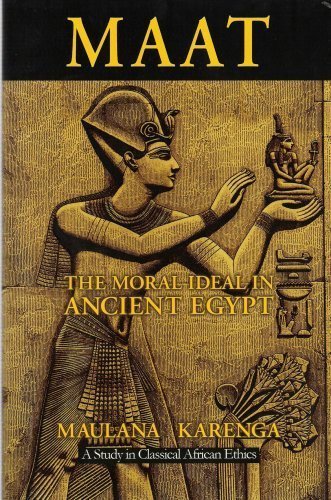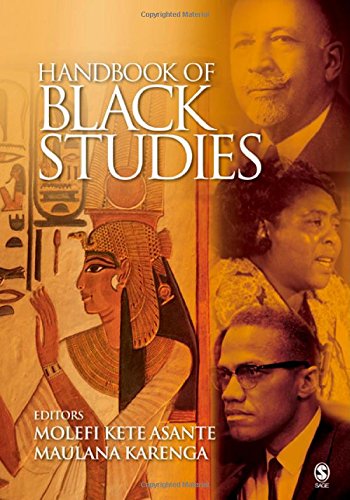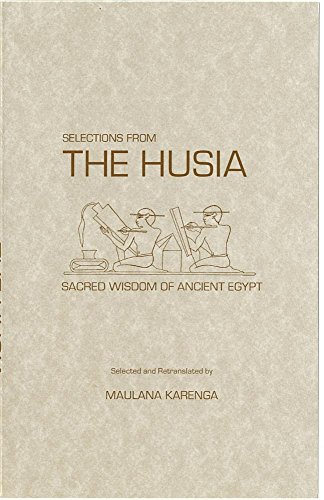Background
The son of a Baptist minister, Karenga was born Ronald McKinley Everett on July 14, 194 on a poultry farm in Parsonsburg, Maryland, United States.



(Maat: The Moral Ideal in Ancient Egypt: A Study in Classi...)
Maat: The Moral Ideal in Ancient Egypt: A Study in Classical African Ethics is an unprecedented work of intellectual archeology and critical interpretation of ancient Egyptian ethical thought from an African-centered standpoint. Engaging Maatian thought as a rich resourse for philosophical reflection and modern moral discourse, Professor Karenga, draws on a wide range of literary, historical and archeological sources to recover and reconstruct this ancient ethical tradition in a dual process on interpretation and transmission.
http://www.amazon.com/gp/product/B000HE4MW6/?tag=2022091-20

(The Handbook of Black Studies is the first resource to br...)
The Handbook of Black Studies is the first resource to bring together research and scholarship in the field of African-American studies in one volume. Editors Molefi Kete Asante and Maulana Karenga, along with a pre-eminent group of contributors, examine various aspects of the field of Black Studies. Organized into three parts, this Handbook explores historical and cultural foundations, philosophical and conceptual bases, and critical and analytical concepts.
http://www.amazon.com/gp/product/0761928405/?tag=2022091-20

(A selection and retranslation of the oldest sacred text i...)
A selection and retranslation of the oldest sacred text in the world, with critical commentaries on the richness of the African spiritual achievement and legacy in ancient Egypt. In this selection we read the earliest written record of the dawning of humanity's structured consciousness concerning spirituality and ethics. Here we find, for the first time in human history, the concepts of Maat (truth, justice, rightness), humans in the image of God, human dignity, judgment after death, free will, immortality of the soul, human equality, and social justice.
http://www.amazon.com/gp/product/0943412064/?tag=2022091-20
The son of a Baptist minister, Karenga was born Ronald McKinley Everett on July 14, 194 on a poultry farm in Parsonsburg, Maryland, United States.
He moved to Los Angeles in 1958 to attend Los Angeles City College, and while there became the first black ever elected president of the student body. He earned his bachelor's and masters' degrees in political science and African studies at the University of California at Los Angeles (UCLA).
He was awarded his first PhD in 1976 from United States International University (now known as Alliant International University). In 1994, he was awarded a second Ph. D. , in social ethics, from the University of Southern California (USC).
At the beginning of the 1960s, Karenga met Malcolm X and began to embrace black nationalism and following the Watts Revolt in 1965, he interrupted his doctorate studies at UCLA and joined the Black Power Movement.
In the mid-1960s Everett started the group known as US (meant as a counterpoint to "them") that he "created as a social and culture change organization, " according to The Black 100. It was at this time that he adopted the name Maulana Karenga - Maulana is Swahili for "master-teacher. " All members of US were required to take on Afro-Swahili surnames, learn Swahili, shave their heads, and wear African-style attire. A central element of US was the embracing of the seven principles of the Nguzo Saba, a black value system that was to be a code of living for blacks. The principles consisted of Umjoya (unity), Kujichagulia (self-determination), Ujima (collective work and responsibility), Ujamaa (cooperative economics), Nia (purpose), Kuumba (creativity), and Imani (faith). The goal of this value system was to promote a national liberation of African Americans and US soon attracted a large following among blacks on the West Coast.
Among the blacks who took leadership roles in the black cultural movement of the 1960s were LeRoi Jones (who became Amiri Baraka), Sonia Sanchez, Addison Gayle, Jr. , Larry Neal, and Haki Madhubuti (formerly Don L. Lee).
One year after the creation of US, Karenga introduced a lasting source of black unity by introducing Kwanzaa to African Americans. Kwanzaa, which is Swahili for "first fruits, " is a holiday based on African agricultural rites and communal activities that urges blacks to look back to their cultural roots as a source of celebration. On each of the seven days of Kwanzaa - from December 26 through January 1 - a principle of the Nguzo Saba is acknowledged. Although it coincides with the Christmas season, the holiday has no religious aspects and therefore allows people from all countries and backgrounds to join in without conflicts. After initially being observed by a few hundred people, Kwanzaa celebrations have spread well beyond the borders of the United States in ensuing years.
Throughout the mid-1960s, Karenga's voice was clearly heard in speeches across the nation about the importance of racial pride. His reputation soared due to his role in helping the Los Angeles police limit black rioting after Martin Luther King, Jr. 's assassination in 1968.
Karenga's mediating skills made him in demand for meetings with political leaders that included then - California Governor Ronald Reagan, ex-Los Angeles Mayor Sam Yorty, Senator Hubert Humphrey, and Ford Foundation head McGeorge Bundy. At the same time he was working with these leaders, Karenga's continued outspokenness also put him under surveillance by the FBI.
A number of factors isolated Karenga within the black-power movement. While some African Americans did not care for his overpowering manner, others disagreed with his philosophy for dealing with the problems of blacks; more extremist blacks spoke out against his dealing with whites. The cultural nationalists could not bridge the gap between blacks who wanted to overthrow the system and those who were willing to promote change through the normal political process. Karenga's status was eroded considerably after the killing of Black Panther members John Huggins and Alprentice "Bunchy" Carter by US gunmen in 1969.
It was also felt by many that the so-called cultural movement promoted by Karenga and Baraka compromised the rights of women. Karenga's male chauvinism came to the fore in 1971 when he was arrested and convicted of assaulting a female US member. After he was sent to prison to serve time for his offense, the US organization began to dissolve and was officially ended in 1974.
In prison, Karenga actively complained that his sentence was more harsh than for others convicted of a similar offense, and noted that his repeated parole recommendations were ignored. During his incarceration he maintained a rigorous schedule of activity and received a steady flow of visitors. He would often endure 19-hour work days consisting of work in the prison library, running a humanist discussion group, and conducting research. His studies resulted in articles published in Black Scholar magazine that encompassed subjects ranging from feminism to pan-Africanism.
After three years, Karenga won his freedom due to the efforts of various black elected officials in California. After his release he admitted that US had made mistakes that weakened the movement and compromised its ability to change appropriately with the times. He also revealed an ideological reawakening by announcing his adherence to Marxist principles of class struggle. To further press the cause of black unity, Karenga and his wife Tiamoya increased their involvement with the Kwanzaa holiday over the years. By having no elements of elitism, exclusivity, or intellectualism, Kwanzaa is fully accessible to the masses and cannot be claimed as the special province of any one group, according to Karenga.
In addition to serving as professor and chairperson of the Department of Black Studies at California State University at Long Beach in the 1990s, Karenga became chairperson of the President's Task Force on Multicultural Education and Campus Diversity at the school. He also was appointed director of the African American Cultural Center in Los Angeles.
After the 1992 riots in Los Angeles that followed the beating of Rodney King by police, Karenga once again became a voice of healing in the aftermath. Karenga sponsored workshops and lectures to help close the racial wounds resulting from the event. Karenga remained reasonable and called for cool heads while the Rodney King trial was underway and blacks were threatening retribution if the jury gave the police a light sentence.
Now Karenga is professor and chair of Africana Studies at California State University, Long Beach. Moreover, he is the executive director of the Kawaida Institute of Pan-African Studies, Los Angeles, and national chairman of The Organization Us.
Dr. Karenga has authored/published many books and articles during his lifetime.
Known as the man who founded the cultural holiday of Kwanzaa in 1966, Maulana Karenga has played a key role in programs that have defined black identity and helped blacks connect themselves to their cultural roots. He has been instrumental in providing positive symbols to blacks through cultural reaffirmation. His influence is demonstrated by the fact that by the 1990s Kwanzaa was celebrated by over 18 million blacks in the United States, Canada, the Caribbean, Europe, and Africa. He and his wife have presided over hundreds of Kwanzaas all over the world.
Karenga co-founded the black nationalism and social change organization US. With US, Karenga was instrumental in building independent schools, black-studies departments, and black-student unions. As he gained status in the black power movement, he proceeded to organize a series of gatherings to provide blacks with a platform for social change. Working with other black leaders, he set up major black-power conferences in Washington DC, Philadelphia, and Newark, New Jersey, where he was instrumental in triggering development of an ideological framework for black politics in the years to come. Karenga founded the Brotherhood Crusade, as well as housing projects, community health centers, and other associations to aid blacks.
In 2002, scholar Molefi Kete Asante listed Maulana Karenga on his list of 100 Greatest African Americans.
Karenga has received numerous awards for his tireless work and commitment including the C. L. R. James Award for Outstanding Publication of Scholarly Works that Advance the Discipline of Africana and Black Studies, the National Leadership Award for Outstanding Scholarly Achievements in Black Studies from the National Council for Black Studies, the President’s Award for Scholarship and Service in the Development of Black Studies, the Diop Exemplary Leadership Award from the Department of African American Studies at Temple University, the Richard Allen Living Legend Award from the African Methodist Episcopal Church and the Pioneer Award from the Rainbow PUSH Coalition and Citizenship Education Fund.
(Maat: The Moral Ideal in Ancient Egypt: A Study in Classi...)
(A selection and retranslation of the oldest sacred text i...)
(The Handbook of Black Studies is the first resource to br...)
(Book by Karenga, Maulana)
(Book by Karenga, Maulana)
(This is a college book.)
(Book by)
(Dr. Karenga gives a comprehensive description of the anci...)
After some initial interest in becoming a Black Muslim, Karenga became disenchanted with the religion.
A pan-Africanist, Karenga's support of Kwanzaa was an offshoot of his belief that blacks should consider themselves one people, regardless of their country.
Though a supporter of philosophy of black separatism and chauvinist attitudes at first, later he began to embrace Marxist principles of class struggle. Karenga's Marxist leanings showed in his negative opinion of black capitalism, which he felt subverted the black cause and resulted in blacks losing touch with their true identity.
Quotations:
"As cultural nationalists, we believe that you must rescue and reconstruct African history and culture to revitalize African culture today in America. "
"From the beginning, we were into institutional building for both the local and national community. "
"Unless America awakens to the fact that she must contend with us as an enemy, or bargain with us as citizens, it will be to her serious disadvantage. "
"Kwanzaa was created to reaffirm our culture and the bonds between us as a people. "
"As cultural nationalists, we believe that you must rescue and reconstruct African history and culture to revitalize African culture today in America. Kwanzaa became a way of doing just that. I wanted to stress the need for reorientation of values, to borrow the collective life-affirming ones from our past and use them to enrich our present. "
Quotes from others about the person
"Karenga's intellectual voice is born of a mixed palette of teachings, from W. E. B. DuBois to Anna Julia Cooper, a legendary Black nineteenth-century feminist who attended the Sorbonne while in her sixties and received a Ph. D. " - Veronica Chambers
"In Karenga's new view, black nationalism is reactionary because in the pursuit of an elusive ideal of unity it makes class contradictions among blacks. " - Thomas L. Blair
In 1970 he married Tiamoya Karenga.
